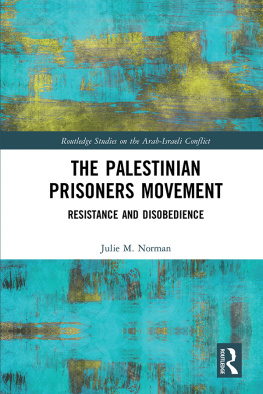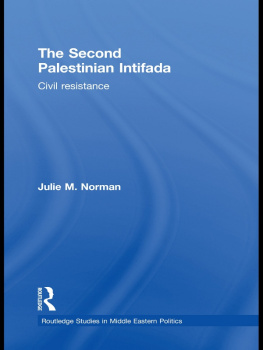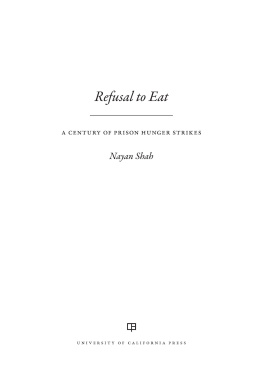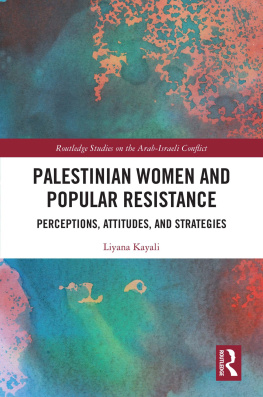Rigorous, humane, and brave. This history of the present illuminates Palestinian resistance in prison in both everyday and more confrontational forms, and how prison resistance has related to the national movement over time. This volume is invaluable especially because it asks us to listen to former Palestinian prisoners themselves. It is an important and powerful read for journalists, policy makers, activists, students, and scholars concerned with Palestinians living under military occupation and (beyond Palestine) with ways of living and struggling in prison.
Amahl Bishara, Tufts University
In situating first-hand prisoner accounts alongside historical analysis, Norman affirms the crucial role the Palestinian prisoners movement assumes within the broad spectrum of Palestinian resistance. This detailed and engaging analysis is an important and timely contribution to the broader field of political resistance to incarceration.
Brendan Browne, Trinity College Dublin
Julie Normans outstanding study uses testimony from Palestinian political prisoners themselves to explore the counterorder they construct within Israeli prisons and how this is linked to the broader dynamics of the nationalist movement. It is at once both sensitive and insightful, with much to offer scholars of Palestinian politics, prison activism, and popular mobilization.
Rex Brynen, McGill University
Using concepts from the literature on social movement and nonviolent resistance, Julie Norman, in superb narrative fashion, explores the relationship between the prisoners movement and the Palestinian national movement. Tracing changes in the prisonsand the prisoners effortsover time, Norman captures the human agency of Palestinians caught in the crossfires of the broader Israeli-Palestinian conflict.
Maia Carter Hallward, Kennesaw State University
In fascinating detail, Julie Norman explores the evolution of the Palestinian prisoners movement. Collective resistance, hunger strikes, education, and mobilisation beyond the prisons all speak to the central role of the prisons in the Israeli-Palestinian conflict. This book is a must read for those who care about the Middle East and political imprisonment in general. An impressive achievement.
Kieran McEvoy, Queens University Belfast
The Palestinian Prisoners Movement
Providing a contemporary history of the Palestinian prisoners movement, this book illustrates the centrality of the movement in the broader Palestinian national struggle. Based on direct interviews with former prisoners and former security sector personnel, it offers new insights into the strategies that prisoners employed to gain rights over time, as well as the tactics used by prison authorities to maintain control.
Prisons have functioned as microcosms of the broader Israeli-Palestinian conflict for decades, with the Israeli state aiming to use mass incarceration for security, and Palestinian prisoners seeking to take back the prison space for organizing and resistance. Prisoners actions included but were not limited to hunger strikes, as prisoners often relied more on everyday acts of noncompliance and developing an internal counterorder to challenge authorities. The volume demonstrates how the Palestinian prisoners movement was intertwined with the Palestinian national movement, strongest in the popular mobilization era of the 1970s and 1980s, and significantly weaker and more fragmented after the Oslo Accords of the 1990s and the second intifada.
Presenting a fresh analysis of a central, but often overlooked aspect of the Israeli-Palestinian conflict, the volume offers valuable reflections on prison-based resistance in protracted conflicts more broadly. It is a key resource to students and scholars interested in contemporary conversations on mass incarceration, criminal justice, Middle East politics and history.
Julie M. Norman is a lecturer in politics at University College London (UCL). She is the author of three books on unarmed resistance in the Middle East, including The Second Palestinian Intifada: Civil Resistance (Routledge 2010), and she publishes widely on conflict, security, and human rights.
Routledge Studies on the Arab-Israeli Conflict
Series Editor: Mick Dumper, University of Exeter
The Arab-Israeli conflict continues to be the centre of academic and popular attention. This series brings together the best of the cutting edge work now being undertaken by predominantly new and young scholars. Although largely falling within the field of political science the series also includes interdisciplinary and multidisciplinary contributions.
The History and Politics of the Bedouin
Reimagining Nomadism in Modern Palestine
Seraj Assi
Palestinian Popular Struggle
Unarmed and Participatory
Michael J. Carpenter
Isreal in the Post Oslo Era
Prospects for Conflict and Reconciliation with the Palestinians
Asad Ghanem, Mohanad Mostafa, Salim Brake
The Russians in Israel
A New Ethnic Group in a Tribal Society
Majid Ibrahim Al-Haj
Palestinian Women and Popular Resistance
Perceptions, Attitudes, and Strategies
Liyana Kayali
The Palestinian Prisoners Movement
Resistance and Disobedience
Julie M. Norman
For more information about this series, please visit: https://www.routledge.com/middleeaststudies/series/SEAIC
First published 2021
by Routledge
2 Park Square, Milton Park, Abingdon, Oxon OX14 4RN
and by Routledge
605 Third Avenue, New York, NY 10158
Routledge is an imprint of the Taylor & Francis Group, an informa business
2021 Julie M. Norman
The right of Julie M. Norman to be identified as author of this work has been asserted by her in accordance with sections 77 and 78 of the Copyright, Designs and Patents Act 1988.
All rights reserved. No part of this book may be reprinted or reproduced or utilised in any form or by any electronic, mechanical, or other means, now known or hereafter invented, including photocopying and recording, or in any information storage or retrieval system, without permission in writing from the publishers.
Trademark notice: Product or corporate names may be trademarks or registered trademarks, and are used only for identification and explanation without intent to infringe.
British Library Cataloguing-in-Publication Data
A catalogue record for this book is available from the British Library
Library of Congress Cataloging-in-Publication Data
A catalog record has been requested for this book
ISBN: 978-0-367-74941-5 (hbk)
ISBN: 978-0-367-74944-6 (pbk)
ISBN: 978-1-003-16038-0 (ebk)
I wish Ghassan would come home. Wisam looks into the camera, fingering a small pendant shaped like historic Palestine that hangs from a chain around his neck. I wish we could go back to hanging out together, playing football together, going to school together, like we always did before.
Back in 2007, Wisam was a 16-year-old boy living in Aida Refugee Camp in the West Bank, just outside Bethlehem. I was volunteering in the camp with Voices Beyond Walls, a project that coordinated film and video production workshops with refugee youth. When the teenagers in my group, two boys and two girls, were discussing what they wanted to make a film about, their conversation quickly turned to their friend, Ghassan, also 16 years old, who had been arrested by the Israeli Defense Forces (IDF) and had been held in detention without trial for several months. The teens used the video project to create a partly scripted, partly documentary film to re-dramatize their friends arrest, including a real interview with Ghassans parents. They called the film, The Necklace, referring to the Palestine pendant that Ghassan had given Wisam just days before his arrest in real life.





